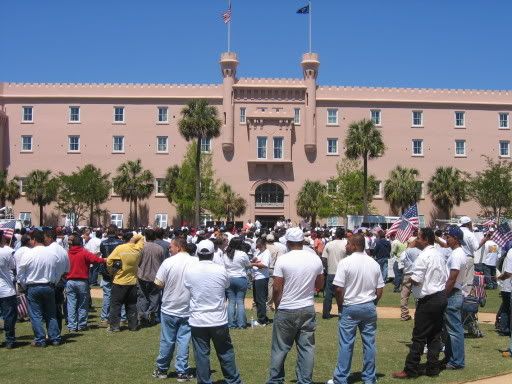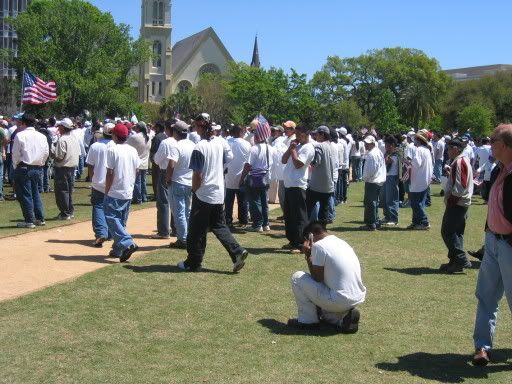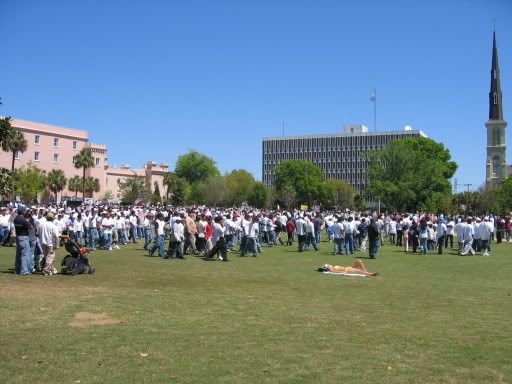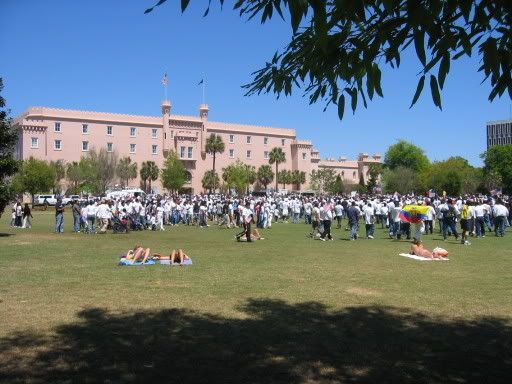Home
American Entropy is dedicated to the disruption and discrediting of neoconservative actions and the extreme ideals of the religious right.




|
George Will Needs a Chill Pill
and he should quit playing scientist also. These conservatives love to play dress-up but in the end they are all hollow.
For some reason my atmospheric physics class was given an assignment where we were to write a position piece assessing the danger of global warming to the environment. But, get this, we were to use the latest anti-science opinion piece by George Will. Anyway, here is my position piece. I think I've put his spin to rest, hopefully I've ended Will's career as a meteorologist as well.
The Will-ingness to Deceive
I never once thought that I would be reading, analyzing, and contemplating the words of conservative columnist George F. Will in a physics classroom. Given the failure of Will’s foreign policy philosophy and its application in places like Iraq and the pathetic approval ratings for the White House, it is no surprise that conservative pundits are pulling out all the stops to maintain their hegemony on power, including--for purposes of this assessment--misrepresenting scientific findings and blaming the media messengers while in the same breath assuming that their reports are accurate. This current conflict arises over the threats of global warming presented by the scientific community and a small group of skeptics devoted to clouding the debate.
George Will is a well-known and respected American journalist and author. According to Wikipedia he received his bachelor degree from Trinity College, his masters from Oxford, and his doctorate in politics from Princeton. As a professor he has taught political philosophy at Michigan State University, the University of Toronto, and Harvard University. Will also worked as a staff member for a Republican Senator for a number of years. It is established and acknowledged that Will has exceptional credentials in terms of politics but zero in the field of science or physics. This is troublesome because physics and science are the focus of the latest attempt by Will to address the issue of global warming as one projecting an illusion of saliency to the American body politic. As a physics and a political science major, I welcome the opportunity to look at the intellectual works of public figures, especially when it encompasses my two main academic interests. Contained below is an assessment of Will’s recent article, “Let Cooler Heads Prevail” (Washington Post, 2 April 2006) in which Will assails the credibility of scientists and—more so and ultimately correctly—the media’s alarm and interpretation of conclusions made by climate experts, past and present.
The initial thrust of Will’s argument is that of blaming the messenger. He correctly points out a relationship between media coverage and social anxieties related to topics addressed in the media. Quoting polling data that indicate that a clear majority of Americans believe global warming is real and that it affects them personally, he maintains that this relationship is a product of some "science-journalism complex." This much of his argument is accepted. If one searches for answers on global warming—or many other subjects—in the mainstream media they are likely to get a confusing result, especially if they take recent reports along with past reports as being currently relevant and accurate. The uncertainty of global systems is a fundamental roadblock to the truth, and science is always changing, calibrating, improving. This is the beauty of science. That stated, much of Will’s argument is either flawed by his own logic or misrepresented in his column.
Addressing the flaws in his logic revolves around the point made by Will to weigh reports in newspapers from the past and those of the present, citing discrepancies between the two. He so much as labels recent reports from ABC News and Time magazine as bogus in his article. Will’s logical flaw arises when he then cites, from several older articles, four news services—members of the group he chastised earlier for a scientific-journalistic conspiracy—a past report that came to a disparate conclusion. This attempt to pull a fast one ultimately calls into question a large part of his argument; are we to use and trust the mainstream media or not and is time a relevant variable or should we trust scientific journalism as infinitely accurate? For the purposes of this assessment, we’ll heed Will’s call and throw out claims made in mainstream media outfits as speculative, misinformed and often alarmist. Although this author strongly disagrees, it is allowed solely for this argument to proceed.
Now to the second flaw committed by Will. Here we will look at a glaring misrepresentation of scientific work made in his article. From above, we will now ignore the parts of his argument dealing with the mainstream media—we will also ignore the fact that Will is a part of this mainstream media—and focus on the peer-reviewed publication Science. In the article that appeared in a 1976 edition of Science Will points out a solitary phrase, "extensive Northern Hemisphere glaciation" as a warning of an eminent ice age. As learned above, one should observe credentials as well as context when analyzing or interpreting data of any discipline. Had Will practiced what he preached he would have seen that the context in which Hays, et al. presented this phrase was in 20,000 year periods of global weather and only with the application of another projection that is independent of the study of concern (p. 1131). Furthermore, in the paragraph just above the paragraph with the quotation cited by Will, Hays, et al. qualify their entire work in two fundamentally troubling ways for Will’s thesis. This paragraph reads as:
First, they apply only to the natural component of future climatic trends— and not to anthropogenic effects such as those due to the burning of fossil fuels. Second, they describe only the long-term trends, because they are linked to orbital variations with periods of 20,000 years and longer. Climatic oscillations at higher frequencies are not predicted. (p. 1131)
The point of this class project was to highlight flaws that occur in science in hopes that the next generation, myself included, will maintain an open-minded even skeptical approach to scientific findings or conclusions that emerge from studies on chaotic systems. This point was exemplified in class with a dated video that warned that the southern hole in the ozone layer was expanding. Although quite a fuss was made, the situation amounted to a mild problem in the long run and was for the most part contained by the world community with appropriate policy action. Whether or not it would have matched the hype of its day if left unchecked by policymakers, fortunately, cannot be known. An alternative and equally important lesson is not to believe the ramblings of pseudo-experts that lack credentials and offer their opinions at the pleasure of their favored cause.
Had Will continued to read Science in the twenty-first century he may have noticed a virtually complete consensus among scientific research that the “Earth's climate is being affected by human activities” (Oreskes). The Intergovernmental Panel on Climate Change (IPCC) concluded that “[h]uman activities ... are modifying the concentration of atmospheric constituents ... that absorb or scatter radiant energy. ... [M]ost of the observed warming over the last 50 years is likely to have been due to the increase in greenhouse gas concentrations" (McCarthy et al., p. 21). In an assessment of related literature, Naomi Oreskes reviews all peer-reviewed published articles containing the keywords “climate change” from 1993 until 2003. Of the 928 positive returns, not one claimed to reject the scientific consensus of climate change. More recently—and ironically due to the time proximity to Will’s article—the 24 March 2006 issue of Science presents a plethora of entries surrounding climate change and its relation to the increase in greenhouse gases over the past centuries.
The points made by this project are clear. Don’t count on the mainstream media to host a viable platform for discussion of the finer points of scientific studies. These outlets often energize the debate with excessive hooks to incite interest in the reader. In addition to this, George Will attempts to fault the scientific community as getting it wrong once before with respect to global climate trends. This is an important skill to embrace. As scientists and citizens we know even the most educated can, have, and will make mistakes and be wrong. Will’s accusation, in this case, is completely discredited by first throwing out sources that are claimed to be routinely wrong or at least exaggerated by Will himself and, second, by looking through the remaining credible sources and revealing the malicious nature in which they were quoted. For good measure we have noted the scientific consensus that exists among climate researchers currently. Such a consensus did not exist in the 70s. Had it existed, would Will have mentioned it?
:::
Bibliography
J. D. Hays, J. Imbrie and N. J. Shackleton. 1976. “Variations in the Earth's Orbit: Pacemaker of the Ice Ages.” Science. 10 December, 194, p. 1121.
J. J. McCarthy et al., Eds. 2001. Climate Change 2001: Impacts, Adaptation, and vulnerability. Cambridge Univ. Press, Cambridge.
Oreskes, Naomi. 2004. "Beyond the Ivory Tower: The Scientific Consensus on Climate Change." Science. 3 Dec., 306, p. 1686.
Science. 24 March 2006.
Will, George F. 2006. “Let Cooler Heads Prevail.” Washington Post. 2 April, B07.
Posted by Geoff
Charleston, SC - Large immigration Rally
|
|















![Validate my Atom 1.0 feed [Valid Atom 1.0]](http://i3.photobucket.com/albums/y54/hfiend/valid-atom.png)
